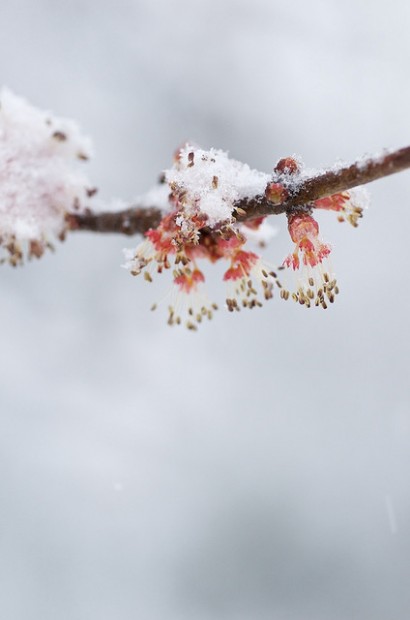We have much more to do and your continued support is needed now more than ever.
GUEST POST: Making a Mild Winter Count
Kimberly Burger Capozzi is a mom and freelance writer based outside Pittsburgh, PA. She has written about parenting issues, wind power and military spending programs, and chronicles her family’s efforts to cook wholesome meals at www.chefzi.blogspot.com.

My kids know snow – the past two winters in our region started in November with heavy snowfalls and chilling cold that extended into March. We bundled up and sledded and played, and physically felt the effects of the Earth’s tilt away from the sun and movement of cooler air over our region. We could on a basic level relate to the animals that grow thicker coats in the winter and those that enter hibernation to survive the cold.
But a winter like this, where our boots have seen more mud than snow? Certain plants have begun to grow again, including a patch of Swiss chard leftover from last year’s gardening. I’ve seen geese and other birds on the move in flocks; perhaps they remained in their northern autumn stopovers a little longer than usual? This season lacks the sense of dormancy, of rest that brings renewal, that a typical winter brings.
Sadly, warmer winters are part of the long term climate change trend that is shifting our weather baseline. Meteorologists and climate change scientists are clear that one wacky weather year does not signal climate change, that it takes many years to establish a warming trend. The current weather, including unusually cold temperatures and snows in the South, has part of its explanations in La Nina’s cooling of the Pacific Ocean and other factors. But global warming is also a factor and there’s nothing like a mild winter to make you imagine a dramatically changed future climate.
Stewards of Winter
Whatever winter is — now or in the future, snow or no snow — I want my children to experience it fully. Only then can they know its value in our ecosystem. I hope they will be stewards of winter as the freezing cold season it ought to be, and to be aware of the implications if that should change.
Simply being outside every day is a big part of our education. We smell the damp earth unperfumed with flowers. When my toddler digs a hole, I point out the absence of insects. We track foraging deer and rabbits by their footprints. I want my boys to learn that winter freezes are important for many plants, and early budding could lead to damage. I explained to my 7 year old that warmer temperatures mean some birds aren’t migrating as far south as in the past, and that means there isn’t always enough food for them all. His solution is to install bird feeders throughout our town – that may be something to think about.
Winter hasn’t skipped us entirely. The few days with snow gave us some excellent sledding, and we played with the white stuff until the last bit melted. The remaining mud in our yard reminds me of melted chocolate, surrounding our boots with each step like they are dipped strawberries. No matter. My kids tried some mud sledding. It’s not as much fun, but I’m glad they’re in the winter spirit.





















